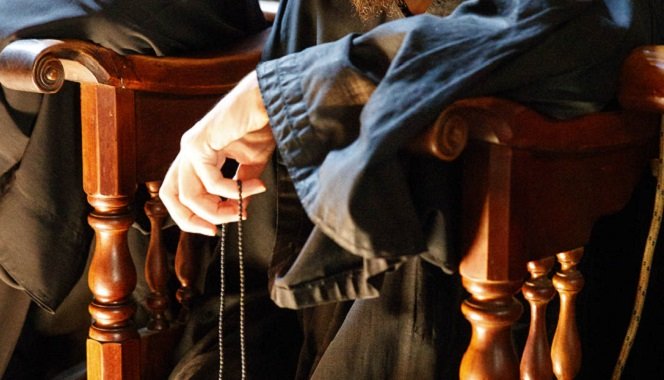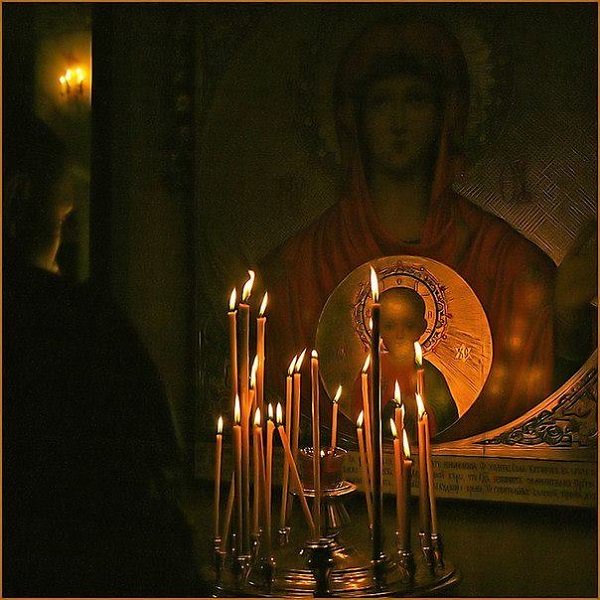Vigilance – the Wealth of Orthodox Asceticism Conversations with Archim. Zacharias
3 August 2020Question: Can you tell us a few words about negative and positive vigilance?
Answer: Negative vigilance is when we resist the attacks of bad thoughts. As soon as they appear, we lift our mind to God saying, ‘Lord, my enemies have come, defend me against them,’ and we try not to allow our mind to give in. Saint Sophrony had a saying: ‘Do not surrender your mind (не дай ума)’, that is, do not give in to the thought of the enemy which assaults you. Negative vigilance is to say ‘no’ to every bad thought that approaches us. Father Sophrony would tell us that all the bad thoughts will go through us so that we may say ‘no’ to all of them and in the end only God will remain. We are not naïve, as Saint Paul says, ‘we are not ignorant of the devices of the enemy’ (2 Cor. 2:11), we know them, but we do not accept them.
Positive vigilance is everything we do in order to be clothed with power from on high so as to become so fearsome to our adversaries that they cannot even approach us. If we live in this furnace of repentance and our heart is burning with tears and bitter lamentation, bewailing over ourselves, if our heart is hot and fervent, the enemy can simply not approach and then we enjoy our freedom. Saint Symeon the New Theologian says that when we have a contrite heart, no thought of the enemy rises to our mind or our lips. The thought is drowned in the throat, before it can come out. Positive vigilance means to build the walls of Jerusalem (Ps. 51:18), that is, to remain within the safety of these walls, to build a spiritual state which can give us the strength to reject the enemy and, in the twinkling of an eye, chase away any sinful thought. This spiritual state becomes an inner strength and it is built up through repentance. In such a state, if we are attacked by a bad thought from the enemy, we feel the approach of that thought before its form is crystallised as coming from a particular passion. We feel that a foreign and hostile energy is approaching, and if we close the door, we do not even see whether it was a thought of pride, or impurity or any other passion. Saint Sophrony says that this is the sign that the mind and heart are united. This is the natural state of the man who lives according to the commandments of God. Thus, the monks always feel the approach of thoughts before they see their clear form, and this is perfect vigilance.

The Desert Fathers from the 4th century in Egypt constantly and continually prayed to be given the spirit of repentance, because they knew that it would protect them and make them fearsome to their enemies. In the oriental religions, the struggle is how to divest every thought and every relative form of existence. However, for us this is only the first and less significant part of the matter: we do not only try to divest the old man with his affections and lusts (Gal. 5:24), but especially to be clothed upon with the new, heavenly and regenerated man, that is, with the incorruptible grace of God which builds for us a dwelling place in heaven. We build this state of inner strength against the enemy through our relationship with the personal God, which is for us eternity, paradise. As the Apostle says, our life is hid in the Person of Christ (cf. Col. 3:3). The greatest virtue for us is humility which sustains love, that is, our relationship with the personal God.
Question: What helps to have vigilance, when something troubles us?
Answer: It is what the Psalm says, ‘I prepared myself and was not troubled’ (Ps. 118:60 LXX). If I quarrel with a brother, all day I continually think of it and I boil inside how to make my revenge more efficient. The same happens with the positive aspect of this phenomenon: if we begin our day by pouring out our heart before God and we weep until we have our fill, and receive the incorruptible consolation of His Spirit, then throughout the day, whatever we do, wherever we are, we know that there is within us a luminous centre and a burning flame, and we cannot forget that we have thrown an anchor in heaven. Saint John Climacus says that as soon as a sinful thought approaches, those who learn to live continually with weeping of repentance immediately hear an inner voice, which is the power of God within them, saying: ‘Beware, if you accept this thought, if you yield to this sinful desire, I shall leave you.’ And of course, no one can be as mad as to give up that incorruptible consolation and joy which repentance brings about. So we can have this continual vigilance when our heart is wounded. Just like two young people in love cannot forget each other, so also the man who has a heart wounded by weeping cannot forget even for one second Christ, the Head of the Body whose member he is: ‘I foresaw the Lord always before my face, that I should not be moved’ (Ps. 16:8).

There is a way to keep vigilance. The Psalm says, ‘I prepared myself and was not troubled.’ How do we prepare? In monasteries monks have this custom to have a rule of prayer in the morning. This helps us to be prepared and to build a spiritual state in us, so that we may not be vulnerable to thoughts, but strong before the face of the enemy. If man cultivates spiritual mourning, he will surely acquire a spiritual taste and he will not be fooled when a thought of the enemy approaches, even if it comes in sheep’s clothing, even if it looks like a good thought. If the thought is from the enemy, it does not have a good energy and the ascetic has an inner taste which makes him switch on his ‘warning lights’ and close the door. In his book on Saint Silouan, Saint Sophrony says that we have true discernment and vigilance when we acquire this inner sense of taste.
Father Sophrony would not give us a rule of prayer, but he would always tell us to say the prayer continually. He said that the true monastic spirit is to try and keep the memory of God and the prayer continuously. If one does that, it is a wondrous life: one sees his life in a straight line, both when he is asleep and when he is awake. For him, vigilance means that if there is any stone on this path, he kicks it out of the way and continues straight. The best vigilance is carried out when the Name of Christ is stuck to the breath of man. Then, all foreign thoughts, all foreign feelings remain outside of that luminous and straight path, which the man of God follows. If one lives with the continuous invocation of the Name of Christ, he does not have to exert himself in vigilance: the very invocation of the Name keeps him free of every alien thought.
Question: Should we still perform this mental prayer when we are strongly aware of the presence of God?
Answer: It will become even stronger if we do it. When the Jesus Prayer is carried out after the weeping of repentance, the mental invocation of the Name of Christ becomes very powerful and effortless. Sometimes it is amazing: with every invocation, a wave of grace comes through the soul. This is what Saint Ephraim the Syrian had in mind, when he said to God, ‘Stop the waves of Thy grace.’ Saint Sophrony says that, out of his great humility, the Saint was asking the Lord to stop the waves of His grace in order to give him the opportunity to show his fidelity even when those waves of grace were not there.
Question: How do we make the difference between the pain of the old man and the pain of the new man?
Answer: We are all at the stage of the old man. The pain which is profitable is the pain generated by repentance in our heart. This repentance begets the desire of God and perfectly harmonises with prayer; in essence, such repentance becomes itself the energy of prayer. In the beginning, when I first learned about the Jesus Prayer, it was like a feast for some time. Then I started having all sorts of bad thoughts that I was ashamed of. I told Father Sophrony and he said to me, ‘Those thoughts were always in you, but you could not see them before. Yet the prayer has now unearthed your heart and they came to the surface. However, through prayer, the energy of these thoughts will become spiritual energy to sustain prayer.’ He was always telling us: ‘Let any kind of pain come; we must only put the right thought and make it energy for prayer.’ Whatever happens, I start speaking to God in my prayer, and that pain becomes energy for my converse with God. After some time, I forget even from where the pain began and I only remain with the refreshment and the consolation of the prayer which I offered to God because of that pain.

Question: How dangerous is it in a monastery, that the monks open their heart to one another?
Answer: It is costly. It is not the ideal situation, unless they have a blessing for that. On the Holy Mountain, sometimes it is allowed for experienced monks of the Great Schema to receive the thoughts of younger monks, even if they are not priests, but it is not a frequent phenomenon. This cannot be done on a systematic basis because it will weaken even the spiritual life of the one who is apparently stronger. Saint Sophrony would also say, ‘If the Hegoumen corrects and reprimands one of the members of the community and another monk supports the one which the Hegoumen reprimanded, that monk must go away from the monastery, because it is considered as rebellion.’
Question: Saint Sophrony said that sometimes when the spiritual father tells us a word, we should not go around saying to others, ‘Father X told me to do that.’ Why?
Answer: Because that word is for us and does not oblige anybody else. It is very wrong when someone comes to me and says, ‘My spiritual father gave me the blessing to do this and this.’ It is good for you, but it does not oblige me. I respect your spiritual father, but this word was given to you, so that you know what is right for you. He did not give you this word so that you oblige me. And again, we must not speak to others because we lose the unity of our spirit. If we stick to the word given to us and we keep it attentively in us, then we shall have unity of spirit, pray better and be firm in our presentation before God. Sometimes we go and ask advice from one spiritual father, then we think, ‘I might ask another spiritual father to see what he will say.’ Then we receive two different words, which does not mean that either of them made a mistake. The mistake is ours, because if we asked one spiritual father and we received a word, but did not keep it, when we go to ask the second spiritual father, we are no longer the same persons. Our state is different, it became more complicated, and we receive another word, which probably corresponds to the new state we have acquired because we have not paid heed to the first word. If we do such things, we shall be divided, and the man who is double minded becomes ‘unstable in all his ways’ (Jas. 1:8).
Question: How dangerous is it to venture to give advice to people when they come to visit the monastery, when we are not invested with this obedience by the Church?
Answer: It is dangerous even for those who have received the ministry to do it. Imagine if we do this without having it! I lament for those who give advice without being entrusted this ministry, because they will either fall into illusion or, in the best case, they will never make progress, because there is pride in this. Even our Fathers did it very sparingly and with great fear, although they had the blessing. Some months before I became a priest and a spiritual father, Father Sophrony gave me the blessing to speak to the people who came to the monastery. Once a young person, under the influence of the word I was telling her, became so contrite that she poured out all her life to me, and I got troubled. I ran to Father Sophrony and he said to me, ‘I gave you the blessing to speak with people in general about spiritual life, but not to receive confessions.’ I learned my lesson. A few months later I was ordained priest and spiritual father, and I started receiving confessions, of which some were even hair raising, but I was not troubled, and I realised that I had the backing of the whole Church that gave me the authorisation to do that ministry. Five months before, I was not a different man. Maybe I had an even better state, and yet I could not do it.






